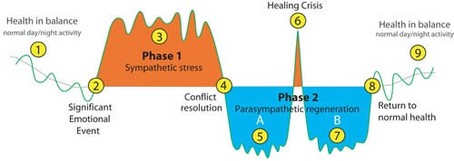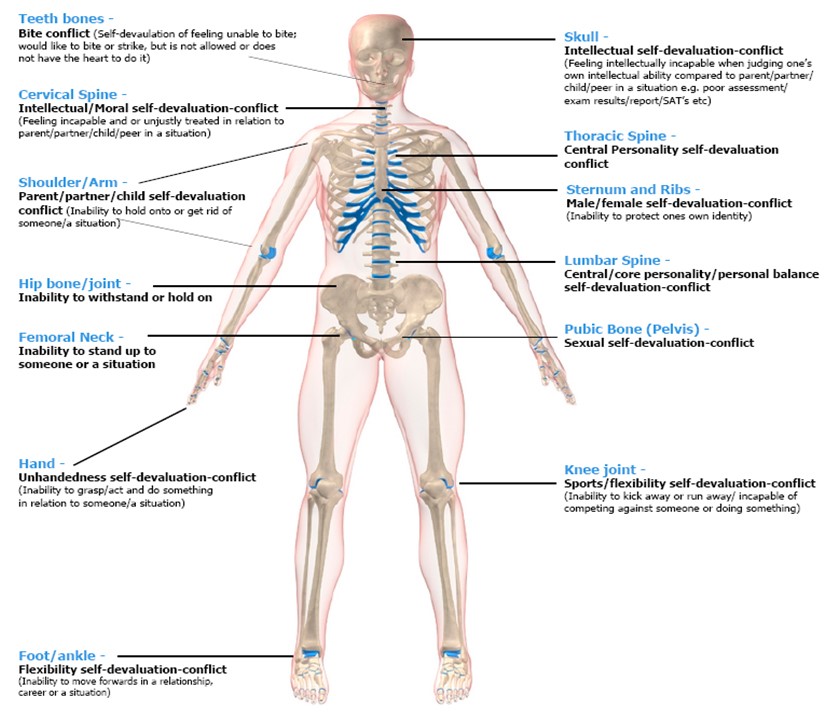|
Why do so many people experience back pain? Back pain is very common and research suggests that almost half of the adult population in the UK (49%) report back pain lasting for at least 24 hours at some point during the year. It is estimated that four out of every five adults (80%) will experience back pain at some stage of their life. Back pain causes, from a modern medicine point of view More often than not, people are not given a specific diagnosis of what is causing their bad back. There is, however, three main things that GP's will often say trigger back pain. Injury Often, people will associate their back pain with an injury at work or whilst doing sports, an accident, postural misalignment or a repetitive strain injury. At first glance, this explanation seems fairly clear cut, but there are two things that this explanation leaves unexplained. 1. Why can people have the same kind of accident and injure a different muscle? 2. Why do some injuries turn into a chronic issue, despite muscle tissue replacing itself after only a few months? Age Back pain (and many other Illnesses/diseases) are often written off as being a normal part of ageing. It does make sense to assume that the longer the back is in stress, the more severe the symptoms will be but as with injuries this explanation has an unanswered question. 1. Why don’t all people get back problems as they start to age? Genetics As with injury and age, it is believed that genetics play a large role in disease. However researchers such as Dr Bruce Lipton are demonstrating that genes are not causal of disease in 95% of cases. Dr Lipton also explains that sharing the same environment with our families makes it more likely that we will share the same beliefs and, therefore, be more likely to have similar health issues. Back pain from a Meta-Health perspective Meta Medicine explains exactly how and why an illness starts. With the exception of poisoning and accidents, all dis-eases begin with a traumatic life event: a dramatic, emotional shock that is unexpected and leaves us temporarily stunned. Whether the shock is a major trauma, hearing bad news or simply seeing something unpleasant, the body-mind takes over, switching into fight-flight-freeze. At the same time, we experience a reaction in a specific organ. Which organ responds depends on the emotion we experience. Meta Medicine maps emotions to organs, via the brain, based on an understanding of the organ’s function, the body’s reaction is always meaningful. In the case of our musculoskeletal system, the affected organ (a specific bone, muscle, tendon etc.) always follows a 2-stage process. 1st Phase (Stress Phase): The affected organ has cell reduction and function loss. This continues for as long as there are still negative emotions about the shock. During this phase there is usually no pain. 2nd Phase (Regeneration Phase): The affected organ now has cell and tissue re-growth and function increase. This happens when the conflict is resolved. It continues until the bone or muscle has repaired and normalised. It is during this phase that the pain is experienced. Another way of looking at it
People who do weight-training will be familiar with the term DOMS (delayed-onset muscle soreness). DOMS is considered a positive sign of muscle regeneration and re-growth. It is essential during this time to rest and take sufficient nutrients to build muscle, so that, next time, lifting the same weight creates less stress on the body. Just like DOMS occurs a day or two after weight-training, the organ regenerates after the emotional shock is resolved. The biological meaning is the strengthening of the organ in order to overcome the devaluation or weakness. The body is adapting to the needs of the situation. What is the emotional link to back pain? The type of emotional shock that begins a musculoskeletal issue is a self-devaluation shock: a feeling of a lack of self-esteem. The part of the body which is affected (back, neck, shoulder, hip etc.) depends on the specific type of emotion experienced at the time of the shock. The reaction is always meaningful (see diagram below for examples).
4 Comments
Archit Mehta
13/9/2023 04:06:59 am
I'm impressed by the depth of your knowledge on the topic. Your post demonstrates a thorough understanding and expertise. <a href="https://8a28ex6aqm9p3m3-z9z9k5nqt0.hop.clickbank.net" target="_blank">click here</a> for more insights and details.
Reply
Archit Mehta
26/9/2023 03:55:40 am
The practical examples and real-life anecdotes you provided in this article made the topic relatable. If you want to explore more real-world applications, <a href="https://8036e2typzflfp0epkr1jz3x04.hop.clickbank.net" target="_blank">click here</a> for inspiring case studies.
Reply
Johny
28/9/2023 10:30:14 pm
Thank you for providing such an informative and well-structured blog post. I appreciated the way you presented the information and the practical applications you discussed. To learn more, <a href="https://b65d57ra2xg49v2gffe-evbq3i.hop.clickbank.net" target="_blank">click here</a>.
Reply
Archit Mehta
29/9/2023 02:55:55 am
Your post offers a unique perspective that challenges the status quo. It's refreshing and thought-provoking. To explore further, <a href="https://265b2-u9jo5u2q7frp39o1zb7x.hop.clickbank.net" target="_blank">click here</a>.
Reply
Leave a Reply. |
AuthorWrite something about yourself. No need to be fancy, just an overview. Archives
March 2015
Categories
All
|



 RSS Feed
RSS Feed